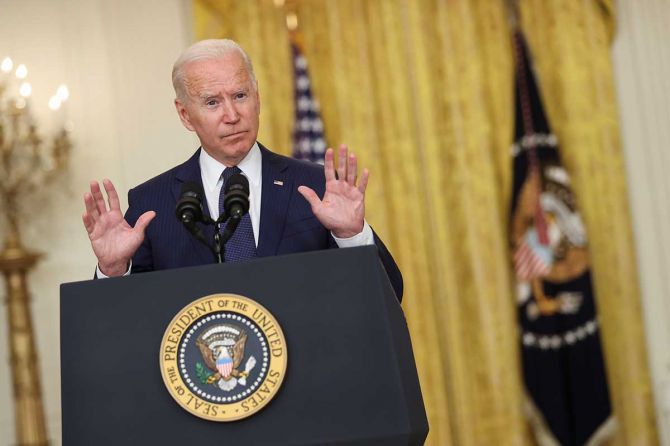Afghanistan will remain a frontline state for Washington for a foreseeable future in terms of the potential threats to US national security from terrorist groups, asserts Ambassador M K Bhadrakumar, who played a stellar role in beginning India's dealings in Afghanistan in 1994.

The horrific terrorist strikes in Kabul on Thursday, which killed at least 13 US servicemen and dozens of civilians, will lead to a higher level of cooperation between the US and the Taliban.
The commander of CENTCOM, Gen Kenneth McKenzie, disclosed to journalists on Thursday that the US was already sharing information on terror threats in Afghanistan with the Taliban.
As he put it, "We share versions of this information with the Taliban so that they actually make searches... We think they've thwarted some."
The US is finally coming round to the Russian view that the real terrorist threat in Afghanistan stems from the Islamic State and not the Taliban -- and, more importantly, Taliban can be a useful partner in the fight against the ISIS.
The Kremlin spokesman Dmitry Peskov said on Thursday that a communications mechanism between Russia and the US on Afghanistan has been established, and contacts are likely to continue.
This follows a phone conversation earlier this week between Russian Security Council Secretary Nikolai Patrushev and the US National Security Advisor Jake Sullivan to discuss the situation in Afghanistan.

The Taliban's victory march into Kabul stunned the Biden administration. The immediate task at hand was to launch the evacuation of American citizens and thousands of Afghan nationals out of Kabul airport.
The daunting security operation necessitated a working relationship with the Taliban -- even as, on a parallel track, the Biden Administration began turning the screws to punish the victorious insurgents by cutting off their access to funds.
On its part, the Taliban has remained largely cooperative. With the comfort level rising, President Biden deputed the CIA director William Burns to travel to Kabul on Monday to meet the Taliban's political chief Mullah Abdul Ghani Baradar.
In retrospect, Burns's mission would have been partly at least to sensitise Baradar about intelligence reports regarding an imminent terrorist threat to Kabul.
Indeed, President Biden himself said more than once in the recent days that the Taliban is an inveterate enemy of the ISIS -- and vice versa. Biden probably signalled to the Taliban about a limited convergence of interests in working together.
Already, in remarks to the press in Washington on August 25, Secretary of State Antony Blinken admitted that when it came to dealing with the Taliban government, America's self-interests came first.
In Blinken's words, "Going forward, we will judge our engagement with any Taliban-led government in Afghanistan based on one simple proposition: our interests, and does it help us advance them or not."
Blinken added, "As a practical matter, it advances our interests" to engage with the Taliban, saying that an Afghan government that keeps its commitments to renouncing terrorism, protecting human rights, and allowing people to leave is "a government we can work with."
Thus, it is to be expected that the terrorist attacks in Kabul will prompt a major rethink in Washington's approach to the Taliban.
What direction it will take remains to be seen. But at any rate, a deeper engagement with the Taliban has become a necessity for Washington for the simple reason that they are the compelling reality in Kabul and they control almost the entire Afghanistan -- and happen to be implacably opposed to the ISIS and sundry other terrorist groups.

Biden's message was loud and clear when he threatened the ISIS from the White House yesterday: "We will not forgive. We will not forget. We will hunt you down and make you pay." It means that ostracisation of the Taliban government in Kabul is no longer a viable option for the Biden Administration.
At issue will be the terms of engagement. To be sure, the US will need a strong intelligence presence in Kabul. Thus, the reopening of the US embassy in Kabul may become unavoidable sooner rather than later.
The Taliban are pragmatic. They'll be positive toward the US overtures for engagement, as it can open the pathway for recognition of their government, enhanced international legitimacy, and, most important, access to blocked funds, and resumption of assistance by the international financial institutions such as World Bank and IMF as well as the UN agencies.
An enhanced level of relationship with the US will go a long way to help the Taliban to consolidate its government and focus on governance.
Clearly, there isn't going to be space for any anti-Taliban resistance movement within Afghanistan. The Panjshiris will be smart enough to sense this.

Suffice to say, the paradox is that the horrific events in Kabul on Thursday may turn out to be a political windfall for the Taliban. Afghanistan will remain a frontline state for Washington for a foreseeable future in terms of the potential threats to US national security from terrorist groups.
And counterterrorism will be the leitmotif of the new relationship between the US and Taliban. Of course, the quality of that relationship will depend increasingly on how far the Taliban government is receptive to the US expectations and demands on the security front.
The human rights issues will inevitably get relegated to the back burner. Already, there is grudging acceptance in the West that a democratic transformation of Afghanistan is not to be expected and that prescriptive western values have few takers in that country.

The question henceforth will be not whether Taliban has changed from the 1990s but rather how much it is willing to change. Taliban's strategic autonomy as a manifestation of political Islam will be bolstered.
The best hope would be that as time passes, and Taliban gathers experience in statecraft, it may assume some characteristics of the Muslim Brotherhood with whose ideologues based in Doha it would have had chance encounters in the recent years.
However, for Biden himself, the Afghan debacle has seen a dramatic decrease in his approval rating from voters. As of now, polls show that a majority of Americans would prefer Biden to sit out the 2024 White House run. Meanwhile, any serious reverse in the mid-term elections next year would mean loss of control over Congress, which could cripple the presidency.
There is a serious political crisis at home that Biden has to grapple with. To be sure, the recent events in Afghanistan will seriously affect the Biden administration's attention span and capability to counter the challenge from China and Russia on the global stage.
In fact, the Iran nuclear issue looms large as a huge challenge in immediate terms.
America's credentials to lead its transatlantic allies are already under question.
The G7 Leaders meeting on Tuesday exposed the fault lines. Two days later, the limits to US power were on full display in Kabul.
Ambassador M K Bhadrakumar, who headed the Pakistan-Iran-Afghanistan desk at the ministry of external affairs in the 1990s, served the Indian Foreign Service for 29 years.
Feature Presentation: Ashish Narsale/ Rediff.com











 © 2025
© 2025